I often equate artichoke with crawfish: You have to really work for it. And when an artichoke (or a crawfish — I just hosted a Southern-themed dinner at my house that reminded me of it) is dangling in front of you, it’s such a tease. You want to put the whole thing in your mouth yet you have to pick apart all the pieces before you get to the good stuff.
But I gotta say… All that work is worth it in the end and the more you do, the easier it gets. Even meditative. Every spring I’ll end up with at least 10 freshly picked artichokes from the garden, ready to be trimmed and tossed in an artichoke pasta rustica or an Italian artichoke salad. The next week, there will be 10 more… and maybe those will turn into a jar of marinated hearts (which far surpasses any jar you can buy from the store).
The point is, you can do a lot with an artichoke heart. You just have to get to it first, and you’ll need to set aside a leisurely afternoon for it (because being rushed is no way to approach a bowl of artichokes full of thorns and slippery flesh). Before you throw down the towel in despair and reach for a can of ‘chokes, let’s get to the heart of the matter.
All you need are fresh artichokes, a lemon, a large knife, a paring knife, and a steady hand. Ready?
How To Trim An Artichoke
Using a large knife, I start by slicing my artichoke in half lengthwise. This lets me see how large the choke is and where I need to cut next.
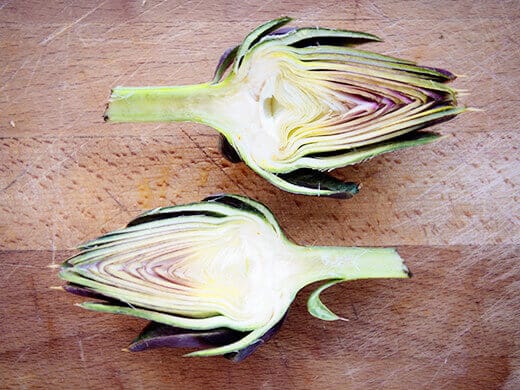
Cut the top part off the artichoke right above the fibrous choke.
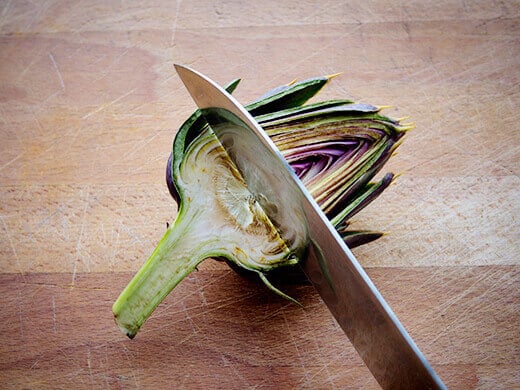
Discard the top part. You’re now only working with the base.
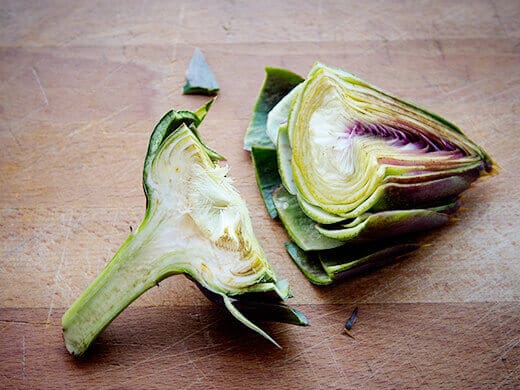
Pull off all the tough outer leaves (known botanically as the bracts, as you learned yesterday) by hand.
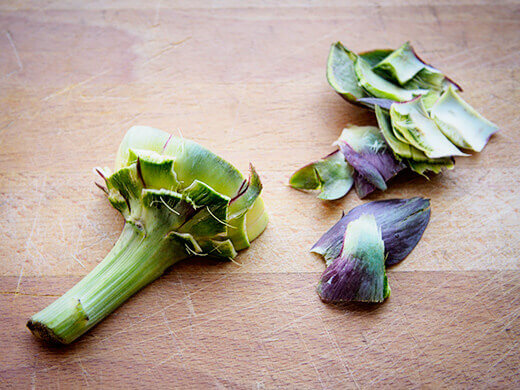
With a paring knife, slice off the thick outer layer on the base and the stem. Do this similar to how you’d peel an apple with a knife. If it makes it easier, you can peel the stem with a vegetable peeler.
Rub a lemon wedge all over the flesh (don’t forget the bottom of the stem!) to keep it from turning brown. This is more for aesthetic purposes, as oxidation won’t alter the taste.
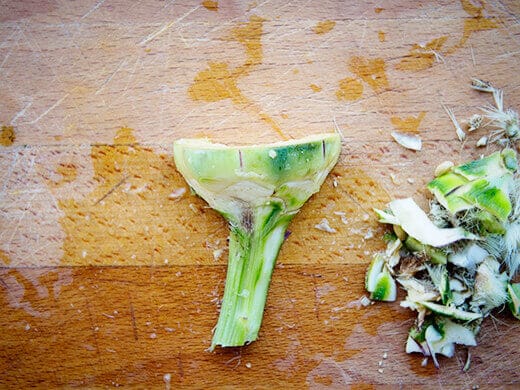
Use your paring knife to cut out the choke. You want to make sure you really get all the fibers out, as any part left on the heart will just be an itchy and annoying feeling in the back of your throat later. Rub more lemon juice on the flesh.
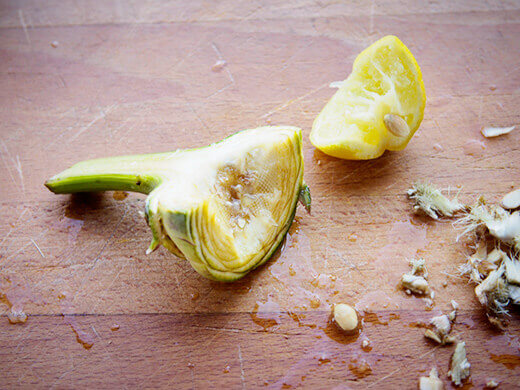
Once you’ve got everything peeled, sliced and juiced, step back and admire your perfectly trimmed artichoke heart… with a bonus stem to boot.
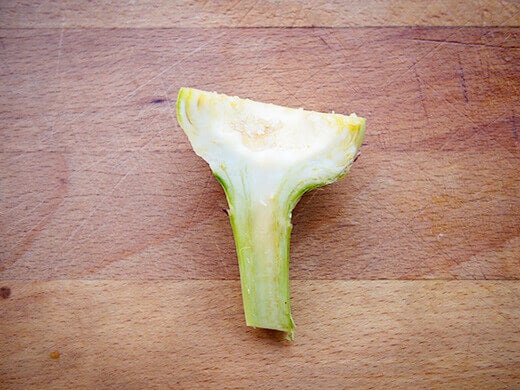
You can chop all this up for dinner right away, or squeeze more lemon juice over it and stash the bowl in the fridge until you’re ready to use. If you don’t plan to use the hearts until the next day, fill the bowl with cold water, squeeze half a lemon into it, and refrigerate.
What will you make with yours first?
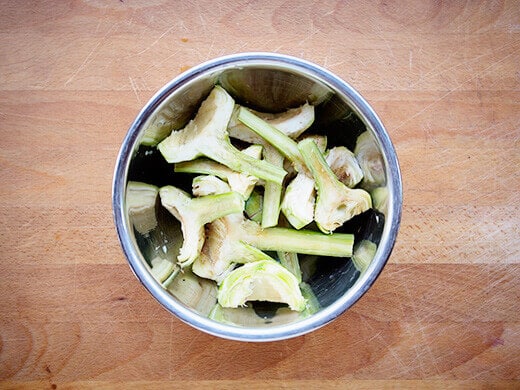
How to Trim an Artichoke
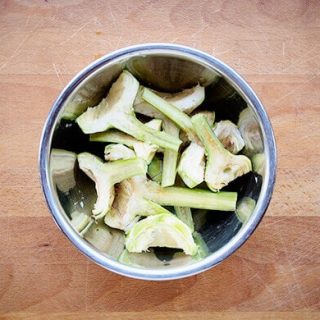
The point is, you can do a lot with an artichoke heart. You just have to get to it first, and you’ll need to set aside a leisurely afternoon for it (because being rushed is no way to approach a bowl of artichokes full of thorns and slippery flesh). Before you throw down the towel in despair and reach for a can of ‘chokes, let’s get to the heart of the matter.
Ingredients
- 3 artichokes
- lemon juice
Instructions
- Cut the top part off the artichoke right above the fibrous choke.
- Discard the top part. You’re now only working with the base.
- Pull off all the tough outer leaves by hand.
- With a paring knife, slice off the thick outer layer on the base and the stem. Do this similar to how you’d peel an apple with a knife. If it makes it easier, you can peel the stem with a vegetable peeler.
- Rub a lemon wedge all over the flesh (don’t forget the bottom of the stem!) to keep it from turning brown. This is more for aesthetic purposes, as oxidation won’t alter the taste.
- Use your paring knife to cut out the choke. You want to make sure you really get all the fibers out, as any part left on the heart will just be an itchy and annoying feeling in the back of your throat later. Rub more lemon juice on the flesh.Once you’ve got everything peeled, sliced, and juiced, step back and admire your perfectly trimmed artichoke heart… with a bonus stem to boot.
Notes
You can chop all this up for dinner right away, or squeeze more lemon juice over it and stash the bowl in the fridge until you’re ready to use. If you don’t plan to use the hearts until the next day, fill the bowl with cold water, squeeze half a lemon into it, and refrigerate.
Recommended Products
As an Amazon Associate and member of other affiliate programs, I earn from qualifying purchases.




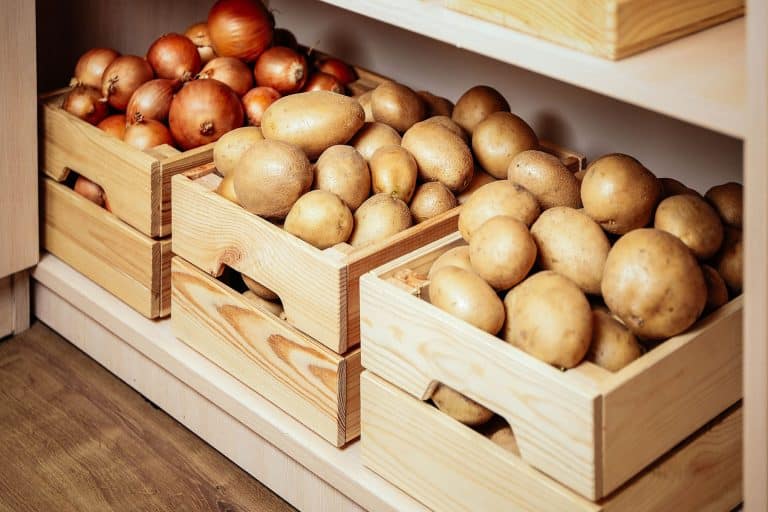


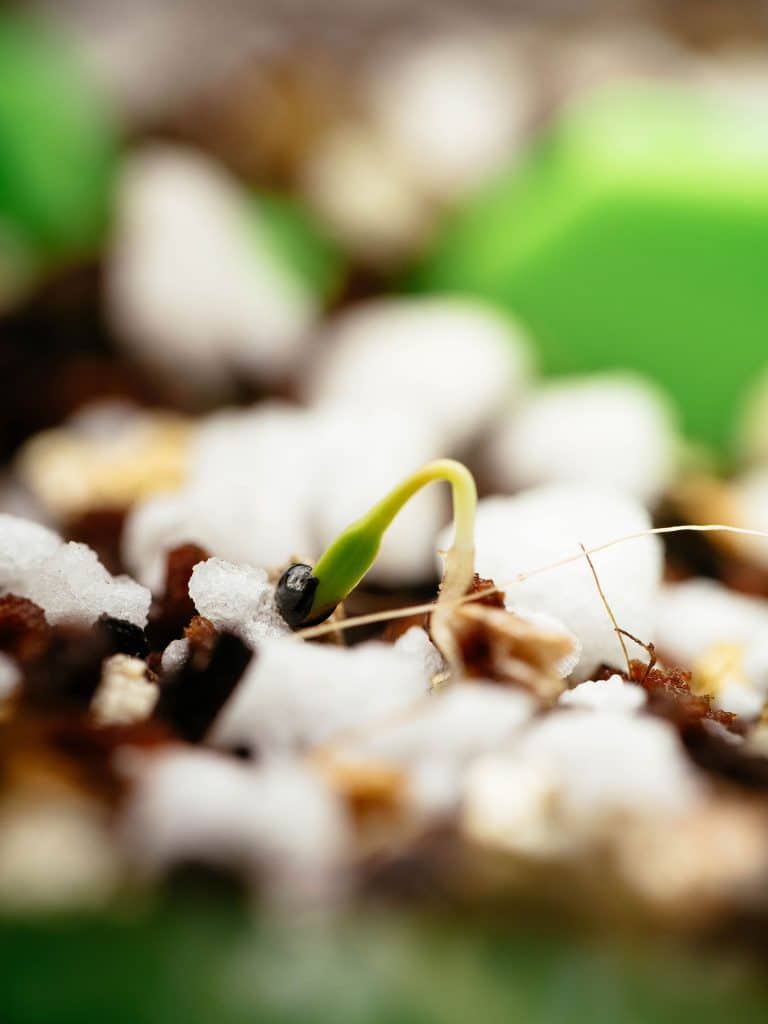


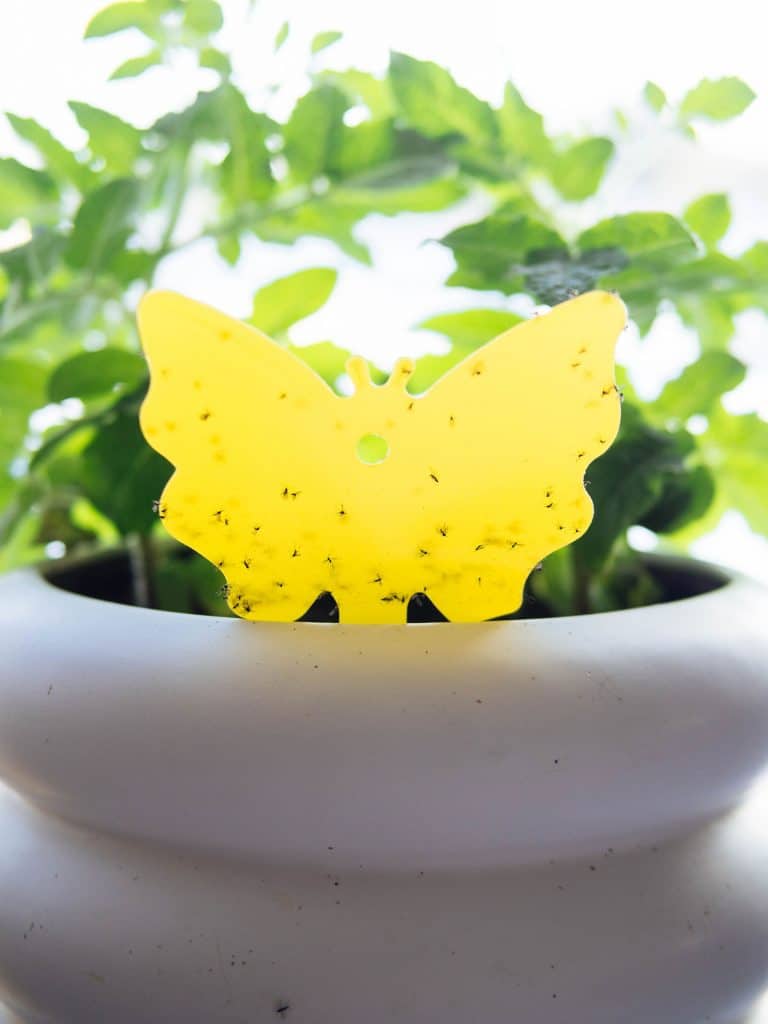
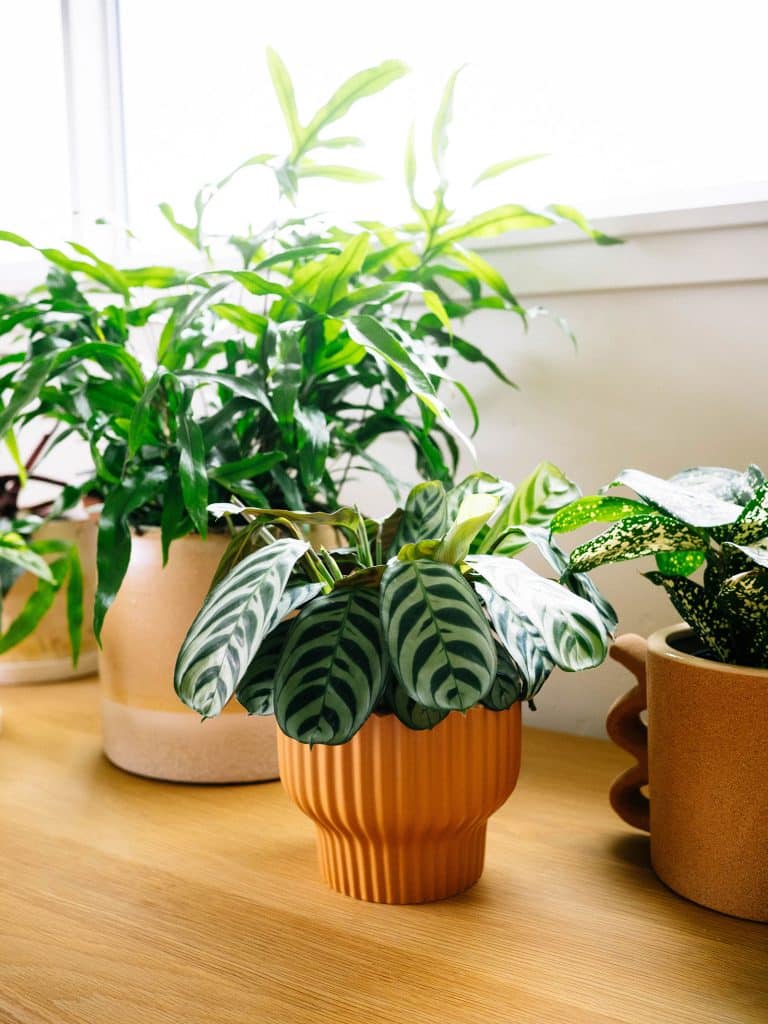
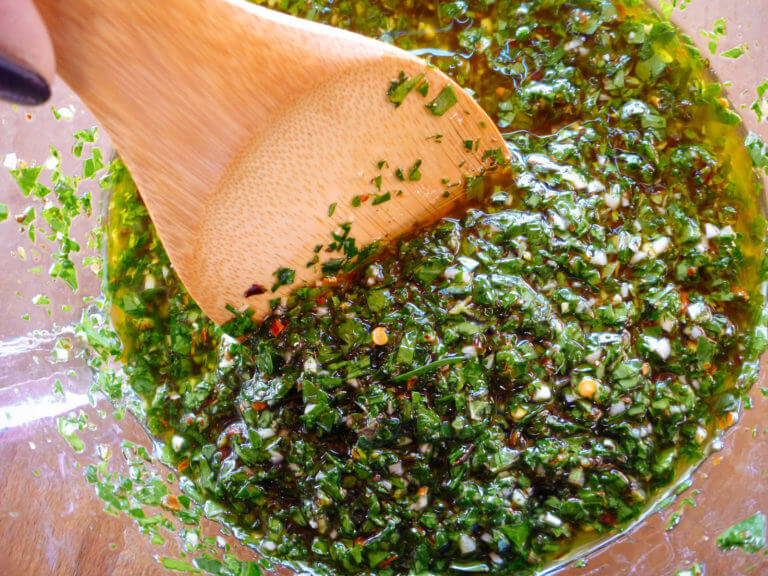
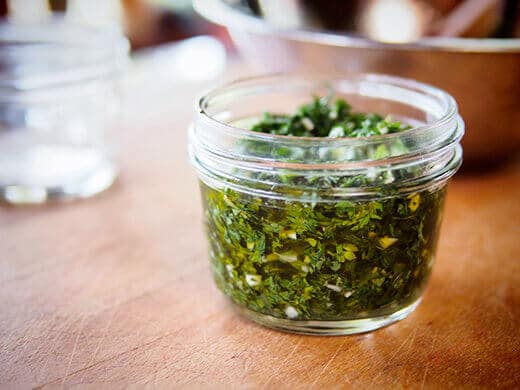

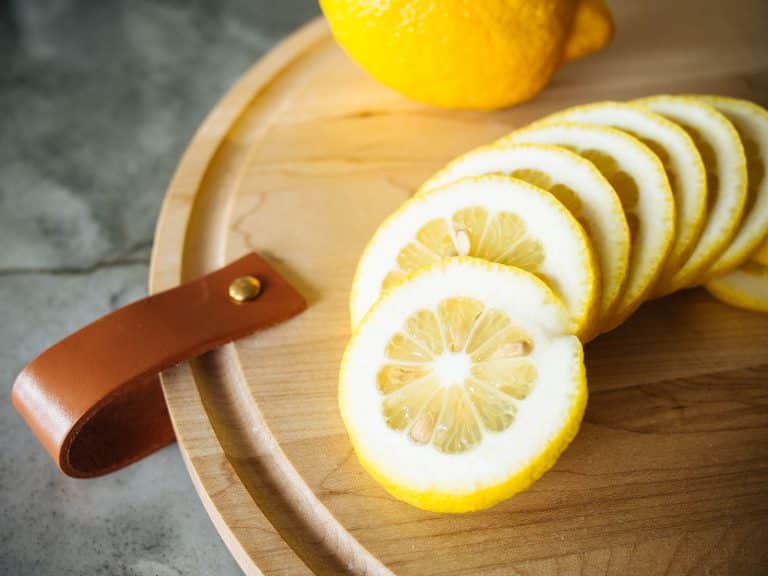

Love the tip about cutting them in half to see where the heart is!! (I have just been guessing, which can be wasteful),
I can often scrape the choke out with a sharp-edged teaspoon.
Also would love to share one of my favorite choke-surplus recipes: it’s like a tapenade:
Artichoke hearts
Lemon juice
Olive oil
Garlic
Green olives (castelvetranos)
Dried spicy pepper
All blended together in a cuisinart.
I love eating this on hearty wheat bread with melted cheese on top!
(And freeze whatever I can’t eat in about a week or so).
I adore your blog…. It is so wonderful for inspiration when the produce is accumulating! I’m from Monterey area, so it is also enjoyable to follow a grower that is in a somewhat similar climate… we keep busy all year round!
Your recipe sounds delightful! Thank you for reading my blog and I wish you a happy spring on the Central Coast!
North Alabama Outdoors Recreation liked this on Facebook.
Essential kitchen skill for foodies: How to Trim an Artichoke (Or… How to Get to the Good Stuff Right Away) http://t.co/ald28DdfXG #recipe
The heart of the matter: How to Trim an Artichoke (Or… How to Get to the Good Stuff Right Away) http://t.co/L7SiWrcvzK #gardenchat #recipe
Get past all the thorns and bracts: How to Trim an Artichoke (Or… How to Get to the Good Stuff Right Away) http://t.co/1pFzo0rfGr #recipe
The easy way to the hearts: How to Trim an Artichoke (Or… How to Get to the Good Stuff Right Away) http://t.co/rVEbYzYtBN #recipe
Let’s get down to it: How to Trim an Artichoke (Or… How to Get to the Good Stuff Right Away) http://t.co/LPkCGCCTrc #gardenchat #recipe
Thanks for the tutorial! It was really cool. Now, will you post a couple recipes or tell how to can the choke hearts?
I’ve never canned artichoke hearts in a boiling water bath, but I do an easy marinade that keeps in the fridge for about a week. Basically, I saute the hearts in a lot of olive oil along with lemon zest and spices (bay leaf, peppercorns, red pepper flakes, oregano, etc… I mix it up every time). Then I pour everything into jars and top off with more olive oil as needed. I let the flavors develop overnight and then use in pasta salads, which are my favorite way to eat them. The leftover oil becomes part of my dressing.
Sounds yummy! How long can marinated artichokes be kept?
I’m guessing a week or so… I always eat it all by that time.
Jill Pickett liked this on Facebook.
How to Trim an Artichoke (Or… How to Get to the Good Stuff Right Away):
I often equate artichoke with crawfis… http://t.co/dulUABSSL1
Blogged on Garden Betty: How to Trim an Artichoke (Or… How to Get to the Good Stuff Right Away) http://t.co/Ivf8WdZK3a